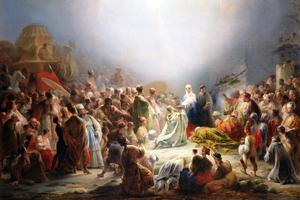Law of Charity Unites Us With God and Neighbor
User’s Guide to Sunday, Feb. 16

Sunday, Feb. 16, is the Sixth Sunday of Ordinary Time (Year A).
Mass readings: Sirach 15:15-20; Psalm 119:1-2, 4-5, 17-18, 33-34; 1 Corinthians 2:6-10; and Matthew 5:17-37.
As anyone who has spent time driving in Washington, D.C., knows, the roads are peppered with automated traffic cameras that issue tickets for speeding and other moving violations. In fact, there are approximately 120 speed cameras operating in Washington every day. Yet this does not mean that motorists have stopped speeding. Instead, they learn where these cameras are located and then adapt their behavior to avoid tickets; it is not uncommon to see automobiles moving 10-15mph over the speed limit suddenly slow down for a few seconds as they pass a speed camera before resuming their former rapid pace.
This image of the speeding motorist reflects a similar attitude that believers can sometimes have toward religious law. We sometimes think of it as being comprised of a set of burdensome rules that constrain our behavior and that are ideally circumvented when a loophole presents itself. Of course, this mindset is a bit silly if we truly believe that God is all-knowing and all-powerful — God’s judgment is not like a traffic camera that can be avoided or from which we can hide our infractions.
In today’s Gospel, Jesus addresses a misunderstanding of the Mosaic Law that is rather similar to this attitude. Inasmuch as the Jewish people were focused on the minimum required by the Law, they had lost sight of the fact that the Law was meant to be a testament to the personal relationship that they had with God. The Law was always meant to mark the people out from the world as God’s unique portion (Deuteronomy 32:9), and it served as a guide through which they were to maintain that relationship. Because the people had come to regard it more and more as a set of external rules and obligations, however, Jesus Christ sought to re-present the Law as an inner principle of charitable, loving behavior.
We see an example of this re-presentation of the Law in today’s Gospel, where Christ makes a series of statements in which he says, “You have heard that it was said to your ancestors. … But I say to you …” In each of these statements, Christ first cites a basic prescript of the Law and then explains how it must be lived in a deeper way than previously imagined. For example, according to Jesus, it is not enough simply to refrain from killing someone — one must also avoid unleashing unjust anger in the form of verbal abuse.
In this way, Christ’s discourse on the Law in his Sermon on the Mount (Matthew 5-7) challenges everyone in his audience, which by extension includes us, to allow the Law to be inscribed on their hearts and in their minds so that it might become an inner principle of action and not simply an inert set of external regulations. In other words, Christ teaches that any external action in conformity with religious law is to be a particular expression of the inner law of charity, according to which we are to love God with our whole heart, mind and spirit as well as our neighbor as ourselves (Deuteronomy 6:4-5; Matthew 22:36-40; Mark 12:29-31; Luke 10:25-28). Far from being an extrinsic check on our behavior on the basis of which God will issue citations, therefore, this law of charity is an inner principle of union with God and neighbor.
Dominican Father Jordan Schmidt is an instructor in sacred
Scripture at the Pontifical Faculty of the
Immaculate Conception at the Dominican House of Studies in Washington, D.C.

















